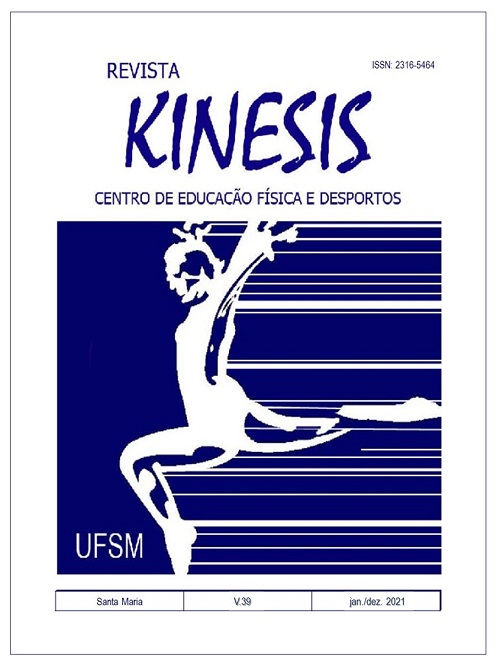Soccer at the Psychosocial Attention Center (CAPS): experience report
DOI:
https://doi.org/10.5902/2316546465584Keywords:
Educação física, Futebol, CAPS, Saúde mentalAbstract
The treatment of users of a Psychosocial Care Center (CAPS) can be done in several ways, one of which is bodily practices, including soccer, as this sport, even in the leisure dimension, brings educational and health related possibilities. This experience report aims to expose the CAPS as an internship and professional intervention field in the Physical Education (PE) area and, even more, to demonstrate how soccer can be a great treatment resource for these users. A Participant research of soccer classes was made by an intern of the bachelor’s degree in Physical Education in the second half of 2019, since they observed and intervened in the “Soccer Group”, planning and discussing with the internship’s supervisory
teacher and the CAPS teacher the activities that would be applied. The focus of this experience report was to demonstrate how bodily practices enable professional/user interaction, allowing to monitor activities such as games, as well as contributions to the group such as the reduction of affective dullness, greater participation in the activity, and improvement in technical skills. It was identified that soccer can help the treatment of users in relation to the disorders they present, especially regarding sociability, volition, and
potential.
Downloads
References
AMERICAN PSYCHIATRIC ASSOCIATION (APA). Diagnostic and statistical Manual of Mental Disorders. 5. ed. Arlington, VA: APA, 2013.
BATTAGLIA, G. et al. Soccer practice as an add-on treatment in the management of individuals with a diagnosis of schizophrenia. Neuropsychiatric Disease and Treatment, v. 9, p. 595–603, 2013.
BEACH, S. et al. QT Prolongation, Torsades de Pointes, and Psychotropic Medications: A 5-Year Update. Psychosomatics, v. 59, n. 2, p. 105-122, Mar.–Apr. 2018.
BRASIL. Ministério da Saúde (MS), Secretaria de Atenção à Saúde, Núcleo Técnico da Política Nacional de Humanização. Acolhimento nas práticas de produção de saúde. 2. ed. 5. reimp. Brasília, DF: Ministério da Saúde, 2010.
BRASIL. Ministério da Saúde (MS). Secretaria-Executiva. Secretaria de Vigilância em Saúde. Glossário temático: promoção da saúde. Brasília: Ministério da Saúde, 2012.
ELIA, D. et al. Relatório 30 Anos de SUS: Que SUS para 2030? Brasília: Ministério da Saúde, 2018.
GALDERISI, S. et al. A proposed new definition of mental health. Psychiatria Polska, v. 51, n. 3, p. 407–411, 2017.
GALLAHUE, D. L. et al. Compreendendo o Desenvolvimento Motor. 7. ed. Porto Alegre: AMGH, 2013.
MIKKELSEN, K. et al. Exercise and mental health. Maturitas, v. 106, p. 48–56, 2017.
MILHOMEM, M. A. G. C.; OLIVEIRA, Alice G. B. de. O trabalho em equipe nos Centros de Atenção Psicossocial–CAPS. Cogitare Enfermagem, v. 12, n. 1, p. 101-108, 2007.
MORRENS, M.; HULSTIJN, W.; SABBE, B. Psychomotor slowing in schizophrenia. Schizophrenia Bulletin, v. 33, n. 4, p. 1038–1053, 2007.
ROSARIO, L. H. Martín et al. Antipsychotics and cardiovascular risk: A case/non-case study. Psychiatry Research, v. 270, p. 341-347, Dec. 2018.
SANCHES, L. R.; VECCHIA, M. D. Reabilitação Psicossocial E Reinserção Social De Usuários De Drogas: Revisão Da Literatura. Psicologia & Sociedade, v. 30, n. 0, p. 1–10, 2018.
SOUNDY, A. et al. Investigating the benefits of sport participation for individuals with schizophrenia: A systematic review. Psychiatria Danubina, v. 27, n. 1, p. 2–13, 2015.
TAKEDA, O. H.; STEFANELLI, M. C. Atividade física, saúde mental e reabilitação psicossocial. Revista Mineira de Enfermagem, v. 10, n. 11, p. 171–175, 2006.
WORLD HEALTH ORGANIZATION (WHO). Promoting mental health: concepts, emerging evidence, practice. Geneva: World Health Organization, 2004.
Downloads
Published
How to Cite
Issue
Section
License
Copyright (c) 2021 Kinesis

This work is licensed under a Creative Commons Attribution-NonCommercial-ShareAlike 4.0 International License.
The works must be submitted in the digital format of the SEER platform, via the electronic address: http://periodicos.ufsm.br/kinesis/index. In case of any doubts, contact the editorial team through the email kinesisrevista@ufsm.br. The authorship that publishes in the Kinesis journal agrees to the following terms:
- They retain copyright and grant the journal the right of first publication.
- They allow and are encouraged to publish and disseminate their work online (e.g., in institutional repositories or on their personal page) as this can cause positive alterations, as well as increase the impact and quotation of the published work.







